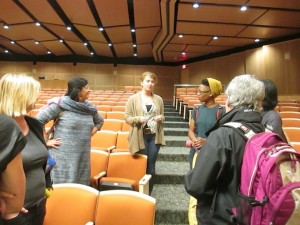Livestreaming Place, as well as Agency, Bodies and Care
By Alexandra Juhasz, Pitzer College
As part of the larger DOCC 2013 effort, I hosted a dialogue between Professors Radhika Gajjala and Sharon Irish—two devoted members of FemTechNet—about their feminist thinking on technology and place. We livestreamed the event from my “Dialogues on Feminism and Technology” classroom at Pitzer College on November 14, 2013. A video of that live event is now available on the FemTechNet Commons.
I hope you will watch this inspiring, interesting, and invaluable conversation between two amazing feminist thinkers (as well as their lively interactions with my amazing students). Here, I hope to provide a more personal frame for your viewing, a few ideas that were raised for me in the doing of this event, in its liveness, and lived-ness; things you can’t know, unless you were there, or I write them here for you online.
Our digital engagements take us to places and people we might never meet in person in material space and this is grand (most of the participants in the DOCC 2013, for instance). But when we do have the opportunities of funds, time, and bodily energy to meet face-to-face, new, complementary, and deeply sustaining opportunities of the flesh arise! It is well worth the effort.
My students have loved “meeting” all the professors and artists we have read this semester on video, through the video dialogues. They discuss how this transforms the authors of the complex and empowering texts we read into people. My students say that they come to understand, by seeing diverse feminists’ interactions online, that real people write what students learn from, and they further realize, as real people themselves, they too are authorized to author.
And then again, to meet the thinkers in person brings ever more delights and possibilities. A different kind of sense of these scholars’ complex selves passes in a look, a smile, a nod, or even a touch. Given that the personal or affective or bodily is so deeply connected to feminist politics, theory, and practice, it is no wonder that engaging with otherwise distant “experts” has particular resonances that are of use to feminist students. Don’t get me wrong, I am aware of the possibilities for intimacy and enlightenment in purely digital encounters! I only want to add to that the particular affordances of the embodied.

Several DOCC 2013 students in conversation with Liz Losh (L), Radhika Gajjala (second from left), and President Maria Klawe (back to viewer), of Harvey Mudd College
When the official Dialogue concluded, my students ended up sitting in a circle quite close to our guests (something we had never done in class before). We seemed to want to signal that we were close, collaborative, and engaged together in something we all cared about. We signaled with our bodies because we could.
This is part of the DOCC challenge to the MOOC. The places we live in and learn in, the places where we come together as situated communities are different, with their own cultures of engagement and interaction and their own styles of and needs for learning.
This placed difference is as vital to our learning possibilities and needs as are the ways that technology expands this reach, opening us up to new places, as particular as our own. (interestingly these same students also LOVED their class with Professor Sharon Collingwood, who generously taught my students last week on Second Life: they sat in a circle there, too.)
And that brings me to care, with which Radhika also ends the Place video dialogue. She expresses how hard care is to commodify, or off-shore (try as neoliberalism will to do so). The felt care that these travellers shared with myself and my students is part of our larger DOCC 2013 effort where we model together the many ways of feminist knowing and teaching, that always attempt to acknowledge the needs of humans in their many places, online and off.



November 18, 2013 @ 9:49 pm
I had a wonderful time meeting students and colleagues – and then promptly this Sunday I also visited Sharon Collingwood’s class as “cyb Tabla” on secondlife.
all very immersive and engaged – in place.
Also wanted to note how productive the exchange with Sharon, Alex and all the participants in Alex’s class was. I came away realizing that some of my experiences and encounters and events were “real” and at least one of my emotional responses (which I rarely admit to anyone) to events that went back to when I was eight years old was validated by young women who were not even born then but seem to have had similar encounters. So much to think about in relation to place, space, time and bodies.
I also came away with a clearer understanding that my own conceptualization and response to conceptualization place, space, time, technology, labor and skill privilege interpersonal and community building practices. Therefore, in talking about place and space what I realize was a gap in my answers to everyone (even though it was referenced) was the relationship between *land* and place (and body).
So yes – I will likely be blogging about this later in December.